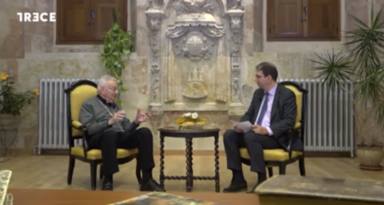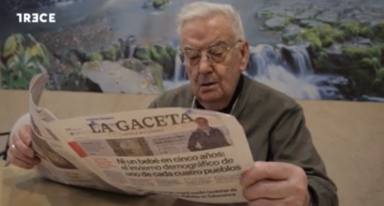Jose Sanchez Gonzalez, emeritus bishop of Sigüenza-Guadalajarawas the pastor of the diocese from 1991 to April 2011. Previously, for almost 12 years he was auxiliary bishop of Oviedo and chaplain of emigrants in Germany for 20 years. now resides in the Priestly House of Salamanca and there he has received Isidro Catela Marcos for the program ‘Emeritus’ of THIRTEEN.
During the new episode, José Sánchez recalled his childhood working in the fields and his town, Fuenteaguinaldo, where he went to live when he retired: “All the other opportunities I had, whether it was going back to Germany, Asturias, Sigüenza or Guadalajara, It was the one that most seemed to me where I could continue doing something and disturb less. He gave masses, did exercises for the priests … ”. But then 2020 arrived, the first year of covid-19, and being a high-risk person, the emeritus bishop could not have a relationship with practically anyone in the town and decided to go to Salamanca: “It seemed to me that this was not life and loneliness is the worst company”.
The emeritus acknowledges that those first months of the pandemic “was a very hard life, of great isolation. It is difficult later to recover a normal life because in the end you do not stop having the feeling that you are a person at risk”.
José Sánchez was born in 1934, what memories do you have of those years? “I only have very vague memories of the war, children marched with wooden rifles […] The post-war years were very hard for everyone and also life in the seminary, when I entered in 1945, was also very hard. […] We were getting by, but really when I see it now that was a lack of freedom, we had control of everything, they were very difficult years”.
Asked if he is saddened by the fact that war continues to be a recurring theme in Spain, José Sánchez acknowledges that he feels sad “that everything has turned upside down again when the great heroic effort was made by many during the Transition to start anew and leave the war behind.” On the root of the lack of vocations in Spain, the emeritus stresses that, first of all, one of it is that “no youth or children. In my town there were eight grades in school, and now there will be 20 children in the whole town”. Likewise, “the very meaning of life is more materialized, everything is focused on economics and parents talk to you more about how their son earns very well at work. Before, having a child in the seminary was something the family was proud of.”.
José Sánchez lived for 20 years in Germany as a chaplain for emigrants: “I myself did not know what I was going to do there […] We arrived and we met a huge number of Spaniards, we celebrated Mass, we organized festivities, we put on movies. The German Church provided us with places for meeting, social and pastoral care. We were doing a pastoral of which before there was no precedent”.
José was named a member of the Pontifical Council for Migrations by John Paul II in 1995. How do you see the migratory phenomenon now? “It has been changing over the years, due to the natural evolution of the population. Today Spain has become a country that welcomes migrants. The Spanish people as such have accepted this situation, politics has had its ups and downs, but They are convinced that the economic situation of the future must be saved by migrants […] I believe that the future has to be in order to accept a multicultural, multiethnic, multilingual society and I believe that we are moving towards that, and everything that supposes division, division, independence movement, sectors, is neither cultural nor has a future nor is it Christian”.
During this latest episode of ‘Emeritus’ with José Sánchez, there has also been time to remember some figures from the Spanish Church who have left us very recently. Reminding Gabino Diaz Merchanpresident of the Spanish Episcopal Conference between 1981 and 1987, José Sánchez highlights three virtues: “He was good by nature, a highly cultured man, and a saint.. He lived Christian and priestly spirituality with all the consequences. He always had a spirit of conciliation, dialogue, forgiveness of the past, hope”.
Ángel Sánchez was also Secretary General and spokesman for the EEC from 1993 to 1998. What feelings come to you from those years?: “They were years of hard work and great satisfaction. There were problems, as is normal, but I was able to reconcile continuing as bishop thanks to my brother who helped me a lot and thanks to my vice-secretary, Monsignor Asenjo. I have a pleasant memory: I was pretty good for the media, they remained respectful and in the end they fired me in a peaceful and grateful situation”.
Lastly, when asked what advice he would give to the new Secretary General of the EEC, Cesar Garcia MaganJosé Sánchez assures that the most important thing is “be open to dialogue, have a lot of patience, value the contribution of the other bishops and be willing to learn”.


